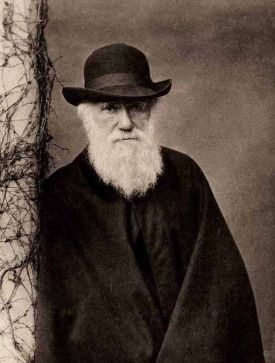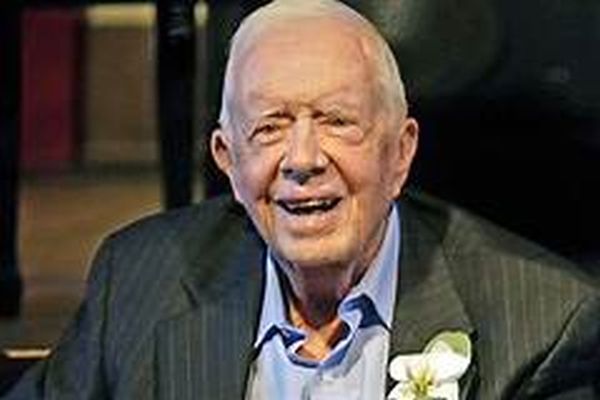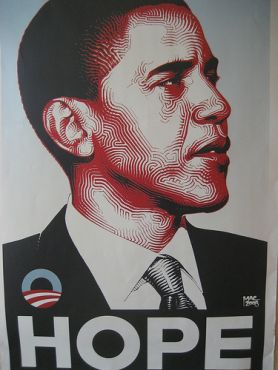The Guardians of the Truth?
Social Darwinism Revived
“This bears on your reporting, I think that there is oftentimes the impulse to suggest that if the two parties are disagreeing, then they’re equally at fault and the truth lies somewhere in the middle, and an equivalence is presented — which reinforces, I think, people’s cynicism about Washington generally. This is not one of those situations where there’s an equivalence.”
President Obama to the Associated Press, April 3, 2012
Well, who can be surprised that the President should have kicked off his re-election campaign’s spring offensive in front of an audience of journalists — or that his address took the form of a slashing partisan attack on Republicans, named and unnamed, which the assembled journalists cheered to the echo. The allegedly “cynical” media have always been the most devoted, the most undisillusionable believers in Mr Obama’s ideas of “hope and change,” whatever they may be, and have supplied him with his most worshipful disciples since his first entry on the national stage only eight years ago. Without them, and their willingness to believe in him, and in his heroic “narrative,” he would not be president today. That he should now be asking them to go the extra mile and discard any pretense of old-fashioned journalistic balance or fairness in reporting the coming election may suggest that he is afraid of the issue of a fair fight, as indeed he has good reason to be, but the lack of any protest from the journalists involved at such a suggestion would seem to indicate that he has judged his audience well, and that the good soldiers of the media are still willing and able to do his bidding.
Mind you, he does have a point about the media’s establishing a dubious “equivalence” in reporting the news. Take, for example, this report from the English language edition of Der Spiegel headed “Campus Callboys: Students Offer Free Sex to Help Coeds Make the Grade” The article’s capsule summary reads as follows: “Three male business students at the University of Mannheim in southwestern Germany are offering a free callboy service to female students who want to improve their grades through an active sex life. The young entrepreneurs claim they are championing female sexuality, but others are doubtful.” The hilarious coda, “but others are doubtful,” is a typical journalistic cover for the reporter’s insertion of his or her own opinion in what is ostensibly a news story, but here the story is so absurd that the editorial caution takes on an absurdity of its own.
In support of her own doubtfulness, the author, Selina Marx, does actually quote one of the five women who, she says, have taken advantage of the callboy service to date, but it is not unusual, at least in American journalism, for readers to be fobbed off with “critics say” or “experts doubt” without the mention of any actual critics or experts. In this case, however, the gesture in the direction of equivalence accomplishes the opposite purpose to that deprecated by President Obama. Ms Marx reports an absurdity with a straight face, only hinting at what all but the stupidest of her readers will know already, namely that the other side of the story, which she barely mentions, is the truth. The President, by contrast, wants the AP and others in the media of like mind with himself to report what he regards as the truth while either not reporting alternative points of view at all or treating them as mere falsehoods. He wants them to tell people what to think and drop the pretense, admittedly often a hollow one, of allowing them to make up their own minds.
And, in fact, that is more and more what we see the mainstream or “legacy” media doing in their coverage of political matters. The President’s exhortation to those he obviously sees as being on his side is actually an indication of the distance already traveled by many traditionally respected news sources like the Associated Press down the road to propaganda. He can assume that his audience knows as well as he does, as well as everybody does, that the pretense of balance is increasingly just that, a pretense. So why not drop it altogether? For if there was no surprise in his lecturing the AP about “equivalence,” there would have been a considerable one if he had suggested that he ever saw any situation where there was an equivalence. This is the meta-politics as practiced by the Obama administration. It’s not now enough for the President to have the media on his side; he also has to prod them into being more vociferously against the other side. It’s not enough for him to be right. That can be taken for granted. It must also be specified just how wrong those who oppose him are.
That, make no mistake, is very wrong indeed. He thinks the media — like car companies or Wall Street or health insurers or the Supreme Court — need to be told by him how to do their jobs only on account of the few lingering points of attachment they have to the past, when they were slaves to old-fashioned ideas of balance that can’t possibly apply to someone like him, someone who is always right. In fact, he was only telling the media what he had learned from the media in the first place: namely that politics is no longer to be regarded as a matter of compromise or trade-offs between incompatible goals, still less as a choice between the lesser of two evils. Now there’s only one evil, and that’s anyone who thinks differently from you — who are, accordingly, good. The partisan media which are in the process of succeeding the establishment media of old are founded on this simple principle, and their business model is now also that of the established media, which is one reason why it is ever more difficult to tell the New York Times editorial pages from the talking heads on MSNBC. Or the Democratic National Committee’s and the Obama administration’s talking points.
For their part, the media are as willing to buy his ideas of how they should do their reporting as they are his ideas about industrial policy or health care or the Constitution. The “this” to which he is referring when he talks of a “situation” in which there cannot be any equivalence between his own point of view and those who oppose him is the debate over the federal budget deficit — which, judging by the amount of time he spends on it in this speech, is one where he sees himself as most vulnerable to Republican attack. Yet it is also his best example of one where there is no merit in the arguments of the other side — which can, accordingly be ignored by the media. Or if, like Paul Krugman, of The New York Times, the media should prefer to write the same column every week reassuring readers presumably eager to be reassured that there is, in fact no merit in the arguments of the other side and that Paul Ryan, in particular, is an extremist, a fantasist or worse, that works too.
You’ve got to wonder sometimes which came first, the smartest president in American history or all the things the media are prepared to certify he is being superlatively smart about. James Fallows of The Atlantic, the guy who is more identified with the “False Equivalence” theory of journalistic malpractice than anyone else, apparently sought no credit for priority when he crowed in triumph at the President’s admonition to his fellow journos: “From the commanding heights of our government, the ‘false equivalence’ problem seems to be coming into view.” It certainly does seem to be an idea whose time has come. As Josh Elliott of ABC News told the Gay and Lesbian Alliance Against Defamation on accepting one of their Media Awards a week or so earlier, “I’m proud to work at a place that believes in advocacy journalism!” Presumably that wasn’t news to ABC.
It’s not just that someone like Josh Elliott practices advocacy journalism. We’ve grown used to that over the last 40 or 50 years. It’s that he’s now open and unashamed about it, as are his employers, who might once have seen in such a boast as his a real threat to the credibility of their news operation. No more. Now ABC and Mr Elliott, like so many others on both sides in today’s media, find it natural to share President Obama’s assumption that if he thinks a thing, it must be right just because he thinks it — and that, accordingly, anyone who thinks anything else must be wrong. It’s becoming the default setting for the rhetorical style which prevails in the media as much as in the speeches of the President and others in political life for whom arrogance would once have been expected to have negative consequences.
Here, for instance, is the opening of a column by Matt Miller in The Washington Post:
Whatever the Supreme Court decides in June, the fight over Obamacare has already taught us tons about the character of the president and the men who seek to replace him. Call it the Good, the Bad and the Ugly. We’ll take them in turn. The Good. The “good” is President Obama. . .etc.
There will be no prizes for guessing who the Bad and the Ugly are. Clearly, this is not just a man who thinks it natural to identify “The Good” as “What I think” and the Bad and the Ugly as what his political opponents think; this is a man who is incapable of seeing anything wrong or even suspect about that simple identification. In other words, he lacks any sense of self-irony — that indispensable quality of good and readable writing which is also death to propaganda.
Or you could consider the words of Ezra Klein, age fourteen. “I’m not particularly worried about the budget deficit,” writes Mr Klein of Bloomberg and The Washington Post. “In fact,” he adds, “of all the major problems the U.S. faces, I’m least worried about the deficit.” Actually, I’m pretty sure he’s more than 14 now, but he sure sounded like a 9th grade civics student, scolded for not doing his homework a year or so ago when he said, “the issue with the Constitution is that the text is confusing because it was written more than a hundred years ago.” As long ago as that? No wonder he and his kind see it as a sort of superstition left over from their grandparents’ generation. Still, say what you will about him, he’s generous enough to relieve our anxieties about the deficit. If Ezra Klein says there is nothing to be concerned about, who will be so bold as to say there is something?
Do such people as Matt Miller and Ezra Klein ever listen to themselves? Does Barack Obama? In a curious way, I think the answer must be no. At least they never listen to themselves as if they were someone else — someone who has attained to a less perfected state of self-assurance than they have. There used to be an expression, perhaps there still is, to describe such people as being “full of themselves.” Well, nowadays the media and politics alike seem to be full of people who are full to bursting of themselves and hardly anyone takes the trouble to notice — presumably because almost everyone else is full of himself too and so has lost the ability to recognize in others this most unlovely of rhetorical as of personal traits. It is a question whether the moralization of politics is responsible for their self-full-ness or if the causation runs in the opposite direction, but the answer doesn’t much matter. Either way, whether you never engage in dialogue with the other side because you assume you are right and they are wrong, or you assume that you are right and they are wrong because you never engage in dialogue with the other side, it comes to the same thing in the end.
The rest of the President’s speech to the AP gave abundant examples of the extent to which he, like so many of us these days, is living in a bubble where he only has to listen to echoes of his own voice and never has to engage with the real arguments of those who disagree with him. Indeed, the speech was almost entirely devoted to the erection of a series of straw men dressed in the clothes of Mitt Romney and Paul Ryan, whom he depicted as desperadoes pushing an “extreme” or “radical” agenda of “trickle-down economics” — a term which no one has ever used except to deprecate it — designed to benefit only the rich and spending cuts targeted at the most vulnerable which together amounted to “Social Darwinism.” This for proposing a plan to return to balanced federal budgets in 30 years! Meanwhile, he claimed that he himself was the real budget cutter, responsible for “the biggest spending cut of any President in recent memory” and making “difficult spending decisions” which (“if you adjust for the economy”) would result in lower federal outlays than any achieved by Ronald Reagan.
So I guess we must have dreamed the five trillion real world dollars that he has added to the federal debt in only four years and the fact that he has no plan to return the federal budget to balance ever? Like young Ezra Klein, he isn’t worried about the budget deficit — not in practice anyway, although he’s happy to pose before the Associated Press as the longed-for champion who’s slashing government spending in words. They know already that he can do anything in words. This is the speech of which the normally level-headed Matthew Parris of the Times of London wrote:
In one short column I cannot do justice to Barack Obama’s very extensive remarks to the Associated Press luncheon in Washington on Monday. . .I do not know how much of the speech was the US President’s own, but if it was written for him, then his speechwriters know their master’s voice. The text was a lesson in seriousness, good humour, thoughtfulness, elegance and simplicity. Modern American prose at its best has a sort of unadorned straight-on-ness that leaves us simpering British standing.
If you say so, Matthew. But does he also mean to suggest that all this seriousness, good humour, thoughtfuless, elegance and simplicity is incompatible with the great orator’s talking the most arrant nonsense? Perhaps it is. Or perhaps even the toughest minded among us are beginning to wonder if it is the President and his cheerleaders or we ourselves who are living in the looking-glass world of the bubble-bound. It’s got to be one or the other, and my self-confidence that it’s not me is not, I have to admit, the equal of the President’s or Paul Krugman’s.
In my other role as a film critic, I bore my readers and sometimes bore myself with frequent animadversions on fantasy in the movies. People are always asking me what’s the harm in a little fantasy? No harm! But what we are discovering is that, in the long run, there is no such thing as a little fantasy. Once you make fantasy the norm, as Hollywood has done over the past twenty or thirty years, everything becomes fantasy. Sooner or later, people forget that there was ever anything else but fantasy, and that it was once a legitimate criticism, not to be summarily dismissed with the cry that “It’s only a movie,” to point to the lack of any resemblance to the real world in what we are seeing on screen. And now that we have learned to live with fantasy, we find that it has come off the screen, like some fantastical monster itself, and crept into every aspect of our public life. The right to our own fantasies — and to treat our own fantasies as realities — is becoming, like the right to be “normal” (see “The Morality of Normality” in The New Criterion of March, 2012), just another federally guaranteed entitlement — and one that, even if all the others don’t, will eventually ruin us. But who needs to care about that? We have our fantasies to protect us.
The purpose of the President’s speech, as of nearly every other encounter he has with the media, is to gain control of “the narrative” — that word of which the media culture is now so fond precisely because it is agnostic about any connection of the story being told with reality or the truth. “The narrative” peddled by one side or the other, or by the media on behalf of one side or the other, isn’t the truth. It’s what people can be got to believe, and President Obama would never have dared to say what he said to the Associated Press if he were not confident that his auditors were already more than half-way to the destination he was proposing for them as the crafters of his presidential narrative rather than the guardians of truth. That’s the great irony of the “false equivalence” theory: that, like President Obama, it is right in theory only because it is wrong in practice. That is, it is right to say that truth is more important than balance, but its mistake in identifying as truth one “narrative” rather than another when both have been created for political advantage, is precisely what illustrates the need for balance if we are ever to get near the truth.
Discover more from James Bowman
Subscribe to get the latest posts to your email.







